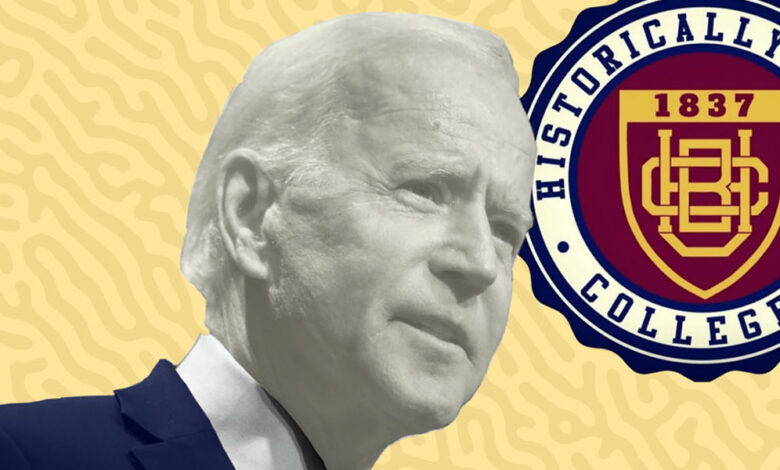
Biden Administration Supports the Powerful Legacy of HBCUs
By
The Biden administration’s American Rescue Plan provides much needed funding to the nation’s underserved communities including 2.7 billion dollars for the country’s historically Black colleges and universities (HBCUs).
Since their beginnings, HBCUs have been an important avenue for retaining and graduating low-income African American students, especially those who are the first in their families to earn a college education. HBCUs graduate more low income students than any other institutions of higher education.
In an exclusive interview with Black Voice News, Dr. Tony Allen, President of Delaware State University (an HBCU) and Chair of the President Biden’s HBCU Board of Advisors, spoke about the administration’s commitment to higher education for underserved communities:
BVN:
Thank you for talking to us today. Higher Education Relief Funding has been very important for families and students with limited resources during the COVID-19 pandemic. More than half of the funding provided by the administration is aimed at ensuring these students are as least impacted as possible. Can you give an example of how this works?
Dr. Allen:
Quite frankly, I can tell you that like most colleges and universities across the country, Delaware State, right after our spring break, advised our students to stay home for the rest of the semester, with the exception of 200 [students]–think of those 200 as otherwise homeless without Delaware State University. Our ability to make sure they were supported throughout the pandemic had everything to do with the support we have received from the Biden and Harris Administration and Congress.

I just cannot overstate the stories of food insecurity and recognizing the support they need for their families as they go from simple college students to main breadwinners. There’s all kinds of things that just came to bear. So to be able to give direct student relief was important to us. Separate from that though, was the institutional support we received, which has been equally important to making sure these students can get across that finish line and graduate.
I’m proud to say that we graduated more students than we ever have over the last two years. We were able to go through a debt relief exercise for our seniors last spring and we are running what I think is one of the best COVID protocols in the country and that has a lot to do with the specific engagement and support of the Biden and Harris Administration.
BVN:
Can you tell me a little bit about the debt relief program and how it works?
Dr. Allen:
We did two things. One, a portion of the dollars we’ve received goes straight to students and in so doing we encourage them, if they have outstanding bills with the university, one of the options can be to pay down some of that debt.
Separately from that with our institutional support, particularly with our last graduating class, we actually eliminated something like $750,000 in student debt for our graduating seniors. So as they walked across that stage we reduced their debt burden to zero and were happy to do that just because of the nature of what they had to go through over the last two years. And, [it was] equally important to make sure they were on equal footing as they begin their career path.
BVN:
How do you envision the rest of the funding being used to address the long-term needs of HBCUs that historically lack funding because of the financial circumstances of their students and alumni?
Dr. Allen:
It is important that everybody remembers the best return on investment in higher education is at HBCUs. There was a report that came out about two months ago that effectively said the greatest factor to an African American man or an African American woman from a low-resourced community entering the American middle class is their graduation from an HBCU.
We are only three percent of all colleges and universities and we’re still the greatest factor in Black folks getting into the middle class. I can’t express enough how important that factoid is and what that means for our HBCU landscape.
The Biden Harris Administration delivered about 5.8 billion dollars (in aid to HBCUs). I’ve talked about the 3.7 billion dollars in direct aid but in addition there was another 1.6 billion dollars in capital debt relief to about 45 HBCUs across the country. The inequalities in respect to our capital and technological infrastructure across HBCUs and predominantly white institutions (PWI’s) is systemic, historic and continues. So, to be able to relieve capital debt for those HBCUs. . . I can’t tell you how significant that would be for any institution.

BVN:
Is there a formula which determined what each institution was entitled to? Could you tell me a little more about that?
Dr. Allen:
Yes. There was a formula. It’s based largely, but not exclusively, on the number of students served and then a percentage of those students who are otherwise low resourced and that’s for all colleges and universities. Those weren’t the only factors but those were two big ones.
But there was a special provision in the American Rescue Plan that was specific to HBCUs. So, think of there [being] two tranches [of aid], one being for all colleges and universities and then there was one that was specific to the HBCU landscape and we were able to access both tranches of funding.
So, again, being able to think through how we begin to correct systemic inequities and make these kinds of allocations as a matter of course is important to President Biden and is certainly critical to my work on the Board of Advisors. [It] is really critical to the future of our HBCUs and I am very very bullish on our future and our prospects.
BVN:
In California, Charles R. Drew University of Medicine and Science has received a significant amount of funding. Are there specific stipulations on how that money is supposed to be spent?
Dr. Allen:
There are always stipulations. There’s nothing that I would call unrestricted. Those stipulations are fairly outlined by the Department of Education and are clear in respect to the regulations that all funding is guided by. What is particularly important to note though is as the administration thought through what was needed by HBCUs . . . flexibility in respect to the use of those funds was top of mind. So yes, there are restrictions. Yes. There are natural reporting requirements just like there would be with any federal award, but flexibility has been important to helping us in addressing many of the ongoing issues organizations like ours face in a regular cycle, but particularly when we’re facing a global pandemic.

BVN:
What would you like the readers to know about the importance of HBCUs and how they will affect the country in the future?
Dr. Allen:
Fifty percent of all college educated Black people in America today got their college education from an HBCU. That’s important because of all the colleges and universities in the country only three percent are HBCUs.
Secondly, we continue to get the best return on investment in higher education because even now while we are only three percent of all colleges and universities, we’re still graduating nearly 20% of all Black students, so we’re punching materially above our weight. Our socioeconomic ability score, a factor used in research classifications and in other rankings across the country, are far superior than many of our mainstream counterparts which is to say you can matriculate and graduate the least advantaged of our student population at the same levels as we graduate the more advantaged of our student population at the same levels. There are not many institutions that can say that proudly as many of HBCUs can, do and always have done throughout our nearly two hundred years of existence.










